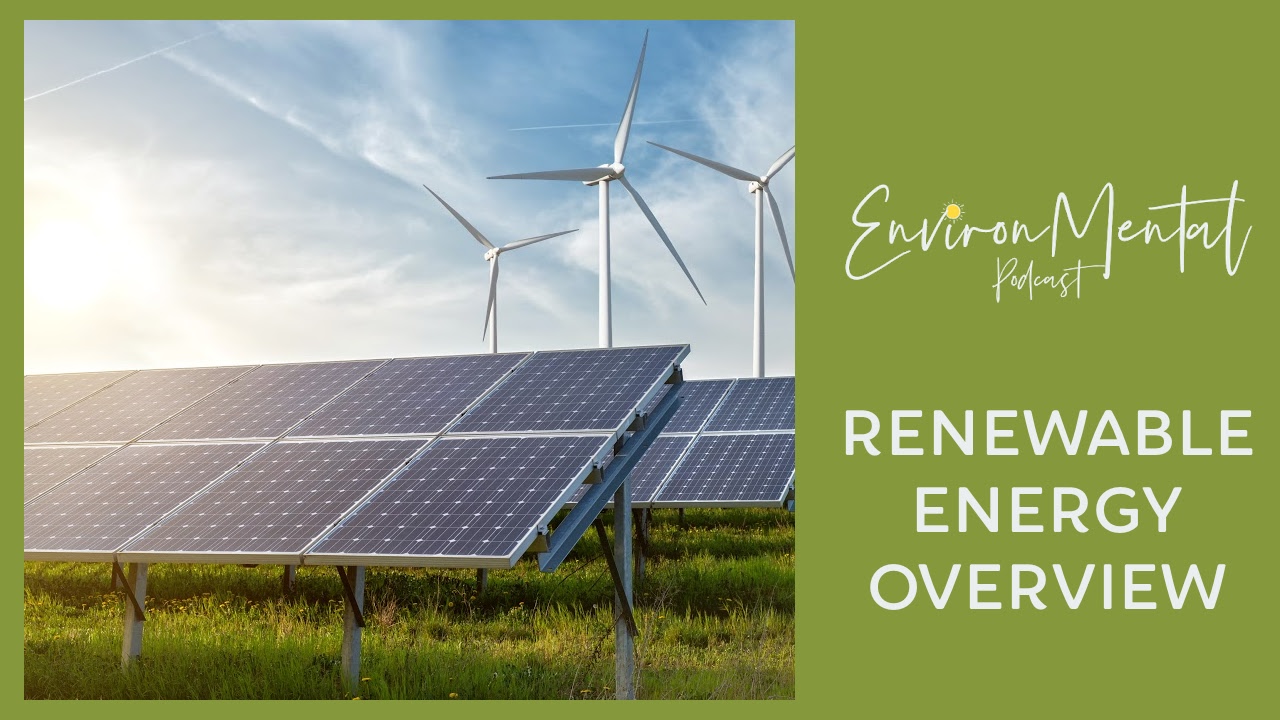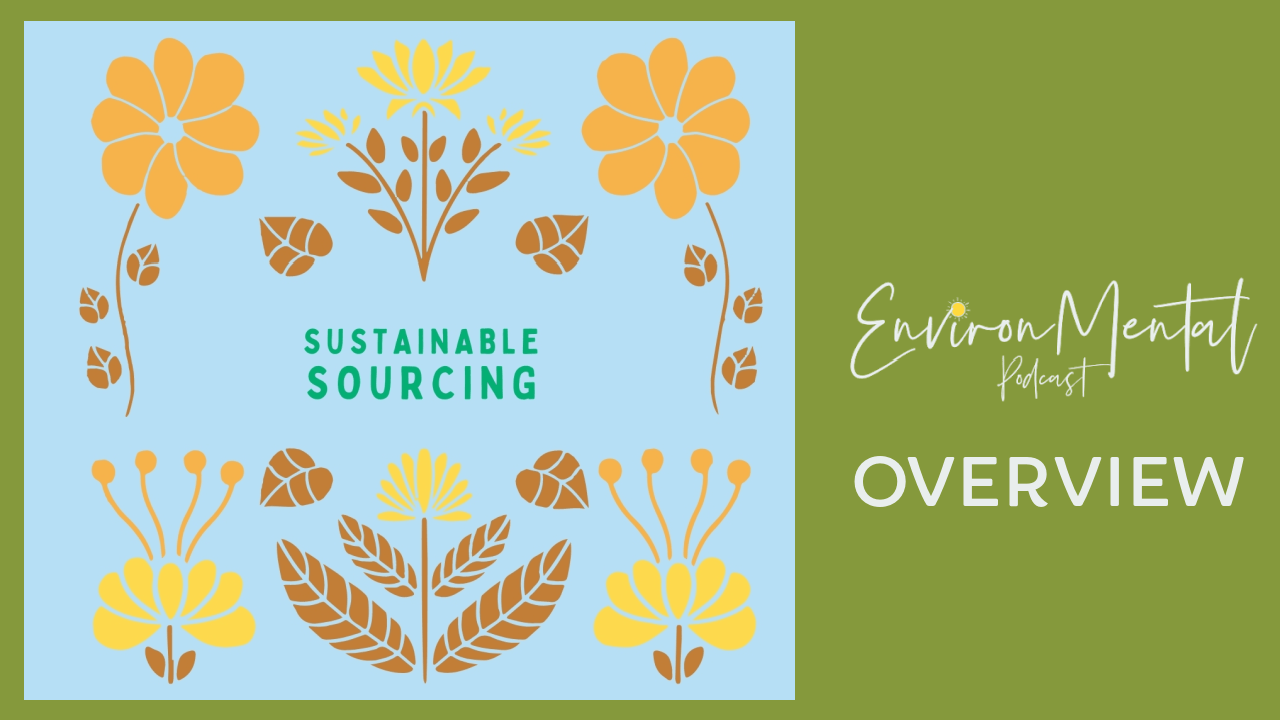Every month we investigate a different topic that weighs heavily on the sustainability industry. We identify our questions, try to understand the whole picture, talk to an industry changemaker, and research independently throughout the month. We record our conversations about each step of the learning process on our weekly podcast – EnvironMental.
Our goal is to understand the global sustainability industry better. We want to see sustainability from all the angles so that we can offer real solutions to brands, individuals, and the industry as a whole.
You can find all of our EnvironMental conversations here.
This month we did a deep dive into the necessary transition away from fossil fuels.
EnvironMental Podcasts May 2021: The Renewable Energy Transition
This is actually the second month that we’re talking about energy, because we spent April of 2021 talking about fossil fuels. So, we started this month by looking into a few questions that we have about the transition.
We learned that even though our capacity for renewables are improving, we have a long way to go before we can say that we are 100% clean energy. We learned that we have about 25-35 years before we need to be off of fossil fuels entirely (not starting the transition), and we learned about Energy Democracy.
Whose in Charge? | EnvironMental Podcast – Energy Transition
In the second week of our podcast, we talked about the book “The Carbon Boycott” by Sam Avery, and whether we think this transition is ACTUALLY possible. Not only do we think that it’s possible to stop using fossil fuels, we know absolutely that it’s necessary.
We also connected with the idea that this is a TRANSITION, not a bandaid. Making small changes like changing your investments and growing some of your food is an important way to get started! Once this is part of your lifestyle, start building communities that are also interested in boycotting carbon. And to make the big transitions when you make big changes. You don’t need to run out and buy a new electric car – but when it’s time to buy a new car, buy electric. When you’re
Can we Boycott Carbon? | EnvironMental Podcast – Energy Transition
And speaking of electric cars and solar panels – we spoke with Tom in the third week of investigating this topic! Tom is my partner, so I talk about him all the time on the show – now you have a face to go with a name! He works with Lightyear, a company that is dedicated to building a super efficient electric car. It has a solar panel on top – so that with typical use, a user will hardly ever even need to charge their car. This. is. The. Future. Amiright?
Tom has also been working with solar energy since 2011, so he knows a good deal about the benefits and drawbacks of solar in general. He told us that YES we do need to put solar panels on everything to produce the power that we need for the transition. But we also need to focus on making sure we are upgrading our infrastructure to handle the increased voltage we need for an electric-only lifestyle.
We asked an expert: Is the transition to solar possible? | EnvironMental Podcast with Tom Vocke
The Truth about the Transition to Renewable Energy
If you have spent any time on the sustainable energy Twitter (Hi follow me, I’m the twitter voice for Dandelion) it’s really easy to get the sense that we can just turn off the pipelines today.
Here’s the thing, though.
We can’t.
Our entire society was built around the use and consumption of natural resources for energy. I mean literally everything. We can’t just turn that off. We’re dependent on fossil fuels right now – unhealthy so.
And have you ever tried to leave a codependent relationship? I mean. The fallout can be crippling, even if you are ready to move on. This isn’t different. It’s just … bigger.
We can’t expect things to stay the same once our old resources are gone. There are absolutely going to be changes to the lifestyles that we’ve grown accustomed to, and unfortunately, we’re not ready yet.
Capacity vs. actual energy from renewables
Our capacity for migrating electricity to renewable energy is ever-growing. (I’m talking about wind and solar here by the way.) This is wonderful news, of course. We need to build the infrastructure and have the capability to transition before we just start pumping renewable energy through the live wires.
But we aren’t there yet. We aren’t even close to filling the capacity of energy that we COULD. It’s unclear whether this is something that just isn’t possible quite yet, or if it’s part of the political energy game. As far as we can tell, it’s a little bit of both.
There isn’t a reliable system (yet)
We don’t have a reliable system to ensure that solar energy that we collect in the daytime can be used throughout the evening (which is when energy is most used).
Cloudy days and days without wind also make for disruptions in the power grid. We don’t yet have the technology to combat this issue. This is an important part of the transition.
And even though we’re really excited about things like microgrids and energy democracy, we also found out that there are new regulation standards being placed on the interconnections of city-wide grids.
Do we think that this has to do directly with the accessibility of energy and a fear of decentralization? You betcha!
Politics is fossil fuels; fossil fuels is politics
It’s not a secret, so I won’t treat it like one. Politicians have had their hands in the fossil fuel industry’s pockets (and vice versa) since John D. Rockerfeller started Standard Oil in 1870. And they have absolutely no interest in changing that.
If you had control of decision makers in your industry, would you voluntarily loosen your grip? No, I know you wouldn’t. Neither would I, and neither will they. Decentralizing access to energy that is equally as free as pulling it from the ground and isn’t dwindling, threatens the hold that industry tycoons have on our legislatures.
Of course we see limits on subsidies given to renewable energy sources. Of course we see policy changes that negatively affect decentralization. Absolutely there is pushback on energy laws like the Paris Agreement and the Green New Deal.
This is a revolution, afterall.
Which means that we will have to contend with it for at least another generation while we start to focus on voting, real policy change, and continuing to grow grassroots movements with candidates that are dedicated to the energy transition.
There is a reality check comin’
That reality check is that we can bicker about the cause of climate change or the impact of fossil fuels all day – it won’t change that we’re running out.
And we’re running out of time to start making plans for what happens when the pumps run dry. We need to make all the steps we can right now so that when reality slaps us in the face, we’re not left in a post apocalyptic Mad Max world fighting over gas fumes and water.
It isn’t necessary.
The Good News Is…
We totally have time.
This doesn’t need to happen tomorrow, but it does need to start right now.
The more that we can find solutions to the energy issues – like increased electricity usage, outdated and inefficient buildings, and the travel industry’s reliance on fossil fuels – the easier we can make the transition away from using up the finite natural resources we have.
We’re not alone in the energy transition conversation
I know it doesn’t feel like it all the time, but there is a massive community of people and professionals out there that are dedicating their lives to helping us through the energy transition. They’re dispersed throughout the general public, yes, but that’s good too. It means that there are green warriors out there spreading the word from within!
Keep fighting the good fight, we will start to see the connections soon!
Energy democracy is already a thing
And speaking of connections – how about one from the past?
Courtney dug into “energy cooperatives” and energy democracy. While she was reading, she felt like the concept was new. But there are actually quite a few already – especially in rural areas around the US! It turns out that the heads of the power companies in these regions bank on the fact that people never even know that they have decision making power in their community’s energy sources. (see above, Politics is fossil fuels; fossil fuels is politics)
This is absolutely changing though. In regions around the US, people are starting to get wise to their game, and they’re taking back their power – literally.
She said, “We can’t expect to have clean energy solutions without having clean election solutions.”
Grassroots politics is stronger than ever
Look, say what you will about social media – it works. More than ever, people are connecting to different issues and topics locally and globally to make changes. There are teens around the world collectively suing governments for not meeting new green standards, and there are grassroots campaigns cropping up all over the place calling for a plan to focus more on transition.
We see this stuff and it gives us hope that we are seeing the beginnings of a new age of technology, energy, and community.
4 Ways Your Small Business Can Help the Energy Transition
I like to end these with information about what you can do as a business owner to help make the transition go more smoothly – for yourself and for your customers.
1 – Share information about the renewable energy transition
Just talk about it with your community. Keep this conversation going, and encourage your audience to talk about it with their friends and family. You can certainly share this post on your own blog or social media if you don’t want to create your own about it, or you can
2 – Donate
The tech needs money and the politicians need time. Donating a part of your business’ profits back into a renewable energy fund is an incredibly valuable way to spend money. Court found the Asian Pacific Environmental Network, who are dedicated to offering BIPOC leadership training for future policy makers!
3 – Invest smartly in renewable energy
Do a deep dive into the investments you have right now to see whether they are supporting energy transition or the old way of doing things. Divest in the things that are supporting carbon-based energy. This is one of the best suggestions from The Carbon Boycott because we don’t always know the connections that our investments have!
If you’re into cryptocurrency, check out SolarCoin. They’re dedicated to making solar energy the standard and rather than supporting something like bitcoin, which is hugely energy intensive, working on supporting new energy
4 – Make your products and transition your office and home to renewable energy sources
This is one of those massive changes that might be challenging right now, but try to aim for your business to be created and run completely on renewable energy sources.
Figure out what your manufacturing takes to power it, and help invest in that whole community’s local energy democracy and transition.
Are you focused on the energy transition in your small business? Share your story in the comments!




